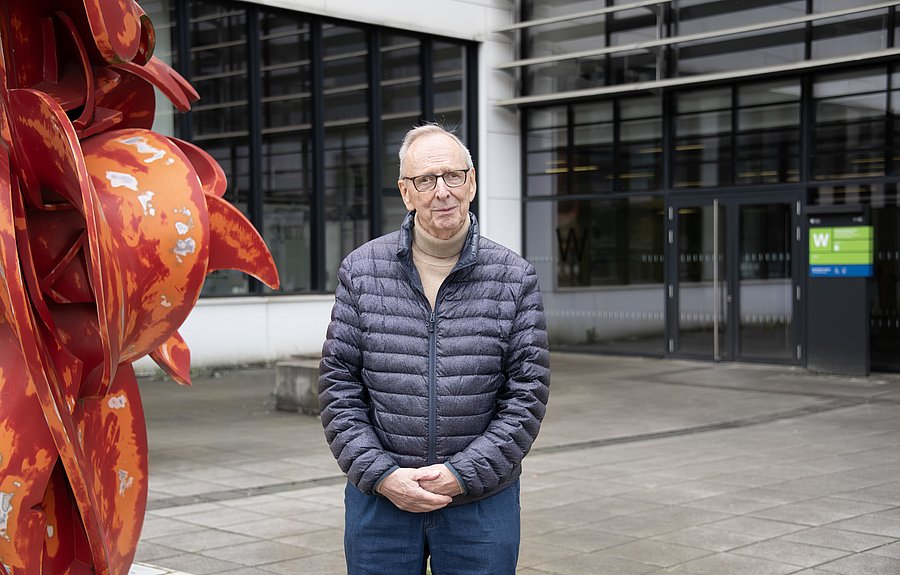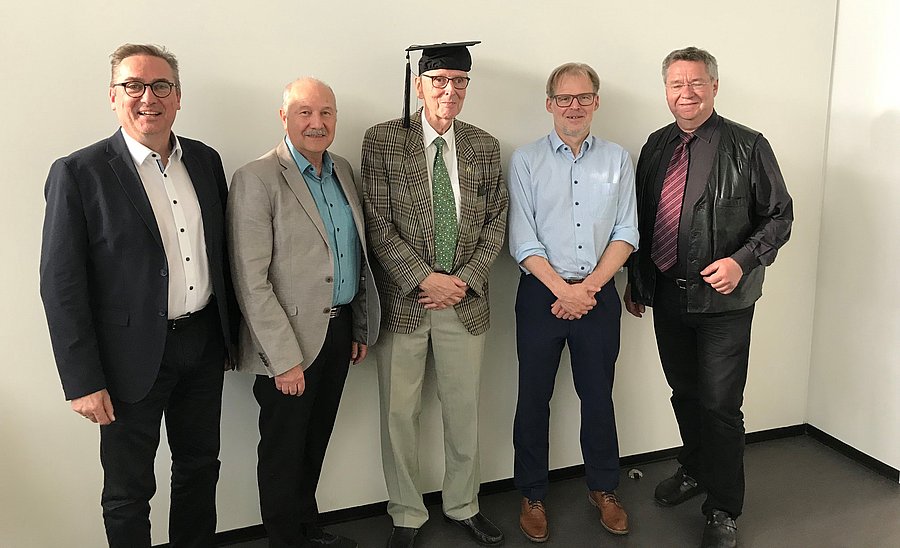Lifelong learning
Retired doctorate: Manfred Hucke appointed doctoral engineer

Retired doctorate: Manfred Hucke was awarded a doctorate in engineering in mid-May // Photo Friederike von Heyden
It was not a spontaneous decision to do a doctorate in retirement. Boredom did not play a role either, as Manfred Hucke knew what to do with his time, both privately and part-time, is active and has hobbies. In fact, in autumn 2016, one thing led to another and Manfred Hucke put the idea that had always been at the back of his mind into practice. He became a doctoral student at the University of Wuppertal's school of mechanical engineering and safety engineering, supervised by Prof Dr Uli Barth.
Before this happened, professor and doctoral student had a different relationship. "I came to the University of Wuppertal in 2010, and from then on I taught courses as part of the then newly conceived international safety workshop for the chemical process industry," says Hucke. Prof Barth had developed this workshop at the request of the Federal Foreign Office in Berlin at his Chair of "Methods of Safety Engineering/Accident Research". It is still held in Wuppertal today in close cooperation with the OPCW, the Organisation for the Prohibition of Chemical Weapons. Participants from all over the world learn how to assess risks and deal with chemical accidents or, in the best case, how to avoid them altogether by taking targeted measures.
Experience as a lecturer
"At the time, Prof Barth and I already knew each other through the Berufsgenossenschaft Chemie, for which I worked as a tutor. In the course of developing the course, he finally approached me and asked whether I could imagine working as a lecturer in Wuppertal," recalls Hucke, who responded in the affirmative. After all, he was no stranger to teaching at a university, having already given lectures at McGill University in Montreal, Canada, in the past.
Over the course of time, the group at the University of Wuppertal discussed risk analysis and explosion protection for so-called process engineering plants, which include, for example, plants in which chemical reactions take place. The group identified exciting gaps in research there. The appeal of tackling these was so great that Hucke approached Prof Barth with the idea of a doctorate. "One of his first reactions was whether I really wanted to do this at my age," says Hucke. But after that, he never again felt any scepticism from his supervisor - on the contrary: "The support I received from Prof. Barth and his team, from the faculty and later from Prof. Roland Goertz, who took over the supervision of the thesis when Prof. Barth himself retired, was great and I didn't take it for granted at all."
In his doctorate, he spent the following eight years, during which the coronavirus pandemic temporarily slowed down progress, investigating the question of what information operators need from a particular type of machine in order to be able to take important protective measures and how to obtain this data. "The focus was on systems for drying, for example, moist dust, powder or grain, known as fluidised beds. In industry, serious accidents can occur with these systems, because in the worst case there is a risk of explosion," says Hucke. This occurs when the material to be processed is combustible and is put into a state called fluidised by the incoming air: all particles are then surrounded by gas, no longer touch each other and are potentially explosive as a dust-air mixture. An effective ignition source is enough to trigger the explosion. "It is desirable to know when this state occurs and how it should be assessed. In the case of the fluidised bed, such a hazard assessment has so far only existed for the state in which the substance is either at rest or is whirled up as a dust-air mixture, but not in the fluidised intermediate state."

Examinee and examination board: (from left) The two supervisors and reviewers Prof Dr Roland Goertz and Prof Dr Uli Barth, Dr Manfred Hucke, Prof Dr Uwe Janoske as chairman of the board and Prof Dr Eberhard Schmidt as an additional member // Photo Bergische Universität
Lots of support and recognition
In his doctorate, Hucke developed a mathematical model that can be used to determine key figures for evaluating the plant, which help production operations to take the right protective measures at the right time. In May 2024, he completed his work by passing the oral examination in front of the faculty committee. "I would do it again," says Manfred Hucke, who never tires of emphasising how grateful he is for all the professional, financial and personal support he received during this time, whether from the university, the German Social Accident Insurance Institution for the raw materials and chemical industry or from his wife at home. "I will certainly remain connected to the university, even after I finish my teaching career in 2022. The contact with everyone involved is very trusting. For the time being, however, I will dedicate the next few months to joint endeavours with my wife, who has had to give up a lot recently," assures Hucke.
The newly qualified doctor receives a lot of recognition from his supervisor Uli Barth. "In technical terms, Manfred Hucke's work is absolutely at the cutting edge. His example also shows that there are real opportunities for older people at the University of Wuppertal in terms of lifelong learning and equal opportunities."
Speaking of which: how old are you, Mr Hucke? "That's not so important. I always say I'm over 70, that will have to do." A doctorate in retirement.
More about Manfred Hucke and his career
Manfred Hucke was born in Berlin, where he studied engineering and worked as a designer. In 1966, EXPO 67 took him to Canada. He was asked to work on a prototype for a fully automatic machine for the world exhibition in Montreal. Hucke drew and designed the machine and eventually built it. He stayed in Montreal and applied to McGill University, where he also took English courses in order to be able to converse professionally. In the end, he was selected from 90 applications for a free Master's programme in machine tool engineering and production. After three years, he held his Master's certificate in his hand and from then on worked as an expert in process optimisation in manufacturing companies.
During this time, he also made his first attempt at a doctorate, which he wanted to realise alongside his job. However, when he was asked to complete it full-time at university, he declined. He remained at McGill as a lecturer until 1974. As Chief Engineer, he left Canada in 1978 and returned to Germany. Here he became responsible for the "Europe Mainland" area for an English company based in Hilden, North Rhine-Westphalia, and from then on was active in the process engineering, coatings and pharmaceutical industries. During the course of Hucke's career, the subject came up again through his former managing director, who pondered the possibility of a doctorate for both of them - and became a persistent dream that he finally put into practice when he retired.
Manfred Hucke still lives in Hilden with his wife Eva.
